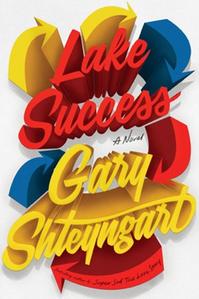
 Gary Shteyngart's 2010 novel, Super Sad True Love Story, offered a disturbing glimpse at a dystopian future for the United States. In Lake Success, his fourth novel, he applies his ample gift for satire, leavened by a keen appreciation for human frailty, to survey an equally troubled present for that same country.
Gary Shteyngart's 2010 novel, Super Sad True Love Story, offered a disturbing glimpse at a dystopian future for the United States. In Lake Success, his fourth novel, he applies his ample gift for satire, leavened by a keen appreciation for human frailty, to survey an equally troubled present for that same country.Forty-three-year-old Barry Cohen is a hedge fund manager with a bit of a literary bent. His This Side of Capital fund, named for F. Scott Fitzgerald's first novel, faces a wave of client redemptions after a three-year losing streak, its assets depleted by more than half, to a mere $2.4 billion. To make matters worse, Barry is under scrutiny by the SEC, on suspicion that he traded on insider information to short the stock of a company about to release a new drug.
And so, in the summer of 2016, he flees his apartment in New York City's Flatiron District, leaving behind his much younger wife, Seema, a Yale Law School graduate who's abandoned her promising career to care for the couple's three-year-old autistic son, Shiva. Barry boards a Greyhound bus with $1,200 in cash and a suitcase full of the vintage watches he avidly collects, hoping to "see the country as it really is" and perhaps reconnect with his first love from his college days at Princeton.
Barry's journey across the Deep South to California--where his father, whose pool-cleaning business in Queens reflects Barry's humble origins, is buried--explores issues of class and race. This is a U.S. in the midst of being torn apart by a bitterly divisive presidential campaign, becoming "archipelagos of normalcy amid a dry, angry heat." But Shteyngart never trades any character's humanity for easy caricature. Barry's interactions with a young drug dealer in Baltimore and fellow bus passengers--all people who would find his affluence inconceivable--range from tender to disturbing.
Shteyngart also skillfully plumbs Barry's psyche. In everything from the size of an apartment to an estimate of another couple's net worth, Barry's lifelong insecurity drives him to an endless process of invidious comparison. And as Seema tries to cope with Shiva's severe autism--what the family refers to euphemistically as "the diagnosis"--without Barry's involvement, Shteyngart offers a painfully realistic portrait of a marriage in crisis.
As is the case with most road stories, much of the pleasure of Lake Success lies in the journey, not the destination. And yet Shteyngart brings the book to a close in a post-trip epilogue that's both moving and profoundly satisfying. For all the uneasy feeling of recognition it may provoke, this is a bighearted novel, whose generosity and essentially good nature might leave readers feeling just a little more optimistic about the future than they are when they pick it up. --Harvey Freedenberg, freelance reviewer
Shelf Talker: Gary Shteyngart's Lake Success offers an MRI of life in the United States in the second decade of the 21st century.

